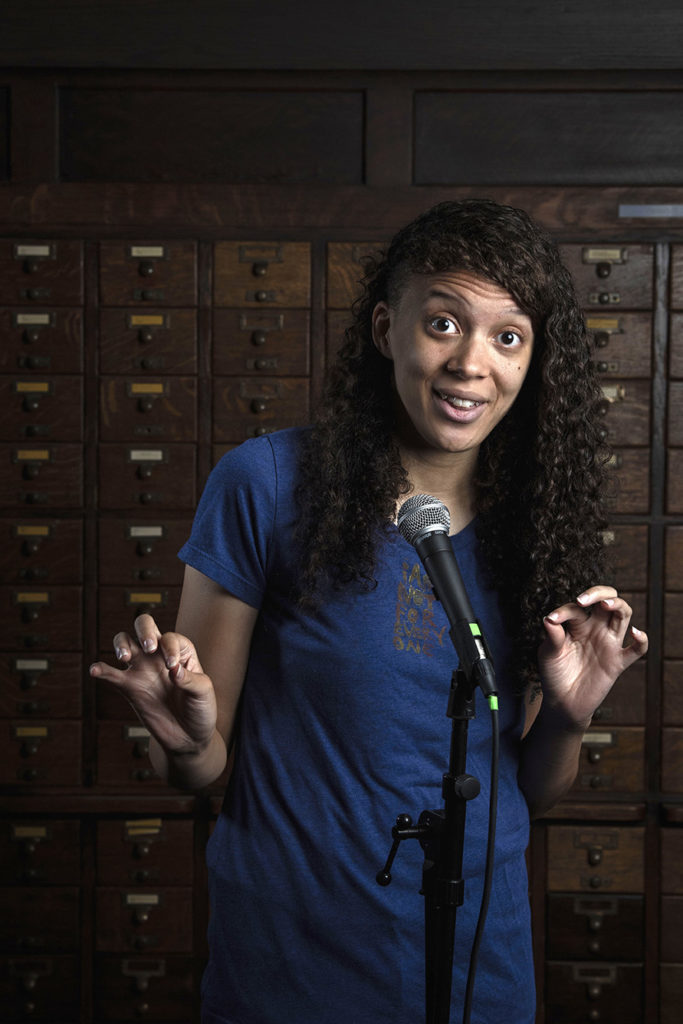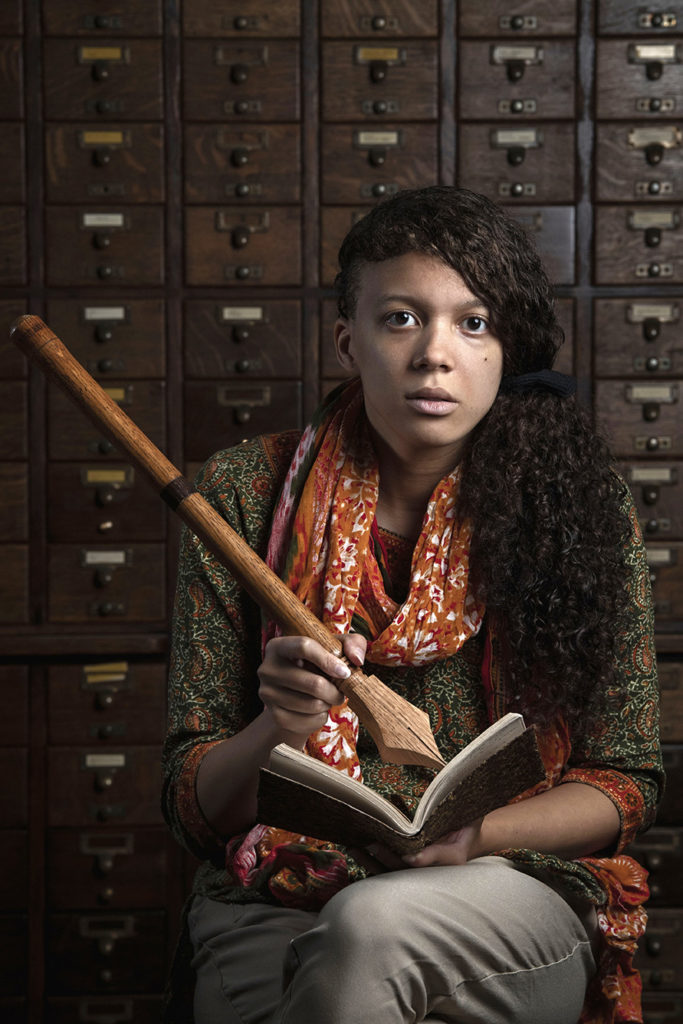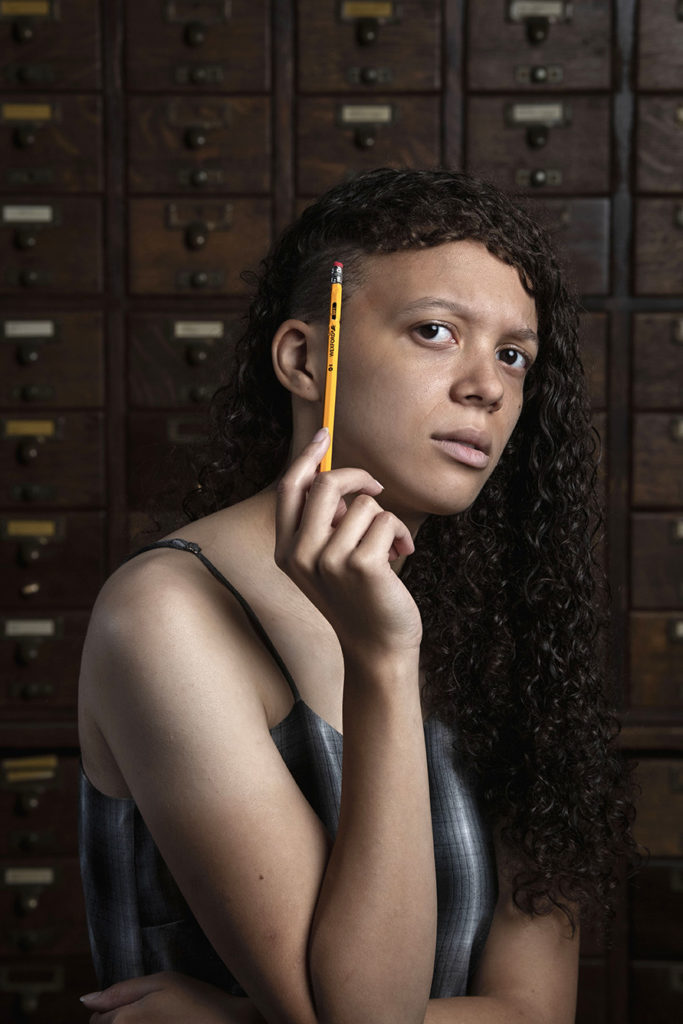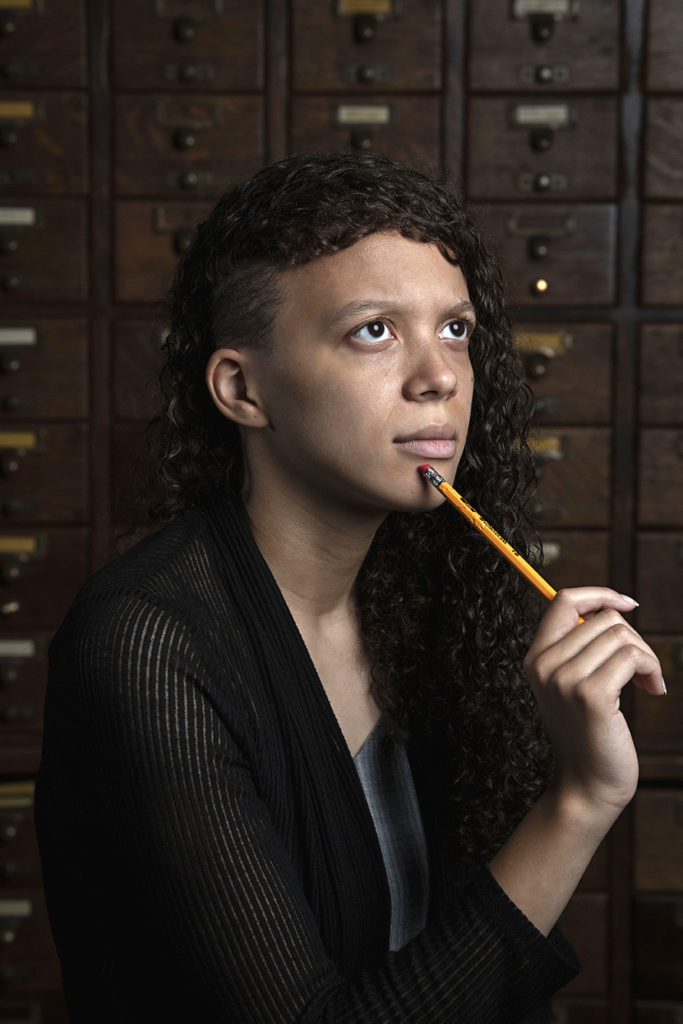Portland’s Poet Laureate Provides Healing Words
Maya Williams, the city’s youngest poet laureate, says “poetry is a way to feel less alone.”

This summer Maya Williams, who is nonbinary, was sworn in as Portland’s seventh—and youngest—poet laureate. Hosted by the Portland Public Library, the honorary three-year position is filled by an artist selected both for their accomplishments in poetry and their tireless community work. Despite being only 25 years old, Williams fits the bill in both respects. They are a Maine Writers and Publishers Alliance Chapbook finalist, a winner of PortFringe’s Patron’s Choice Award for their spoken word performance When Speaking to an Extraterrestrial, and were among three artists of color representing Maine in the Kennedy Center Arts Across America series, hosted by Portland Ovations and Indigo Arts Alliance. Williams hosts an open mic for Port Veritas in Portland and workshops for Quill Books and Beverage in Westbrook, and works as MaineTransNet’s sexual assault program coordinator.
What does one do as a poet laureate?
My specific goal is to make poetry accessible. I’m grateful this position exists and for the people who had this position in the past, and I’m excited to do some new forms of programming, like a workshop series in collaboration with the Portland Public Library about poetry as it intersects with different aspects of identity. I’d also like to collaborate with different arts organizations statewide to create a transgender artist database for Maine-based trans artists. I’ve been wanting to do a large-scale event for suicide awareness called “What Do You Stay Alive For?” It would be a mix of an open mic and a resource hub for different service-oriented organizations.

You’ve been very vocal about being a suicide survivor yourself. How do you feel that poetry has helped you and can help other people too?
Poetry has been a great balm for me. Everyone’s healing process looks different. Healing is nonlinear. But I appreciate how poetry ends up becoming so personal as a way to connect with other people. I’ve realized this from the poet Eloisa Amezcua, that the more specific you are in your poem and in your storytelling, the more you resonate with people. It doesn’t help when you try to be broad. It actually helps when you’re more specific, as a way to let people know that they’re not alone, which is the worst feeling one could ever imagine. Poetry is a way to feel less alone.
You describe yourself as religious. What does that mean to you, and how does it inform your writing?
For me personally, it refers to my personal relationship with God, my personal relationship with my religion, in this case Christianity. As a spiritual practice, I appreciate writing my prayers down, because I believe I’m able to be more honest when I’m writing than when I’m processing things out loud.

What does spoken word do for you that poetry written on paper can’t do?
One of the workshops I’ll be doing this year will be with my friend Gibson Fay-LeBlanc, who’s in charge of Maine Writers and Publishers Alliance, about page poetry and stage poetry and how they intersect. It’s fascinating hearing from people who prefer poetry on the page and who publish on the page, and how often they say spoken word poets are too casual in their writing, or spoken word poets are just yelling, or stage poets are too focused on identity politics. Is it that they’re focused on identity politics, or that they focus on identities you’re not willing to talk about? Are they speaking too casually, or are they just speaking with fewer constraints than you? I do believe there are ways that the two can intersect and combine, and I’m really excited to make that workshop available to folks.
You began writing at age 5 and writing poetry at age 11. Did writing help you to find and express your gender?
I did not come out as trans until almost a year after I moved to Maine. I remember thinking to myself, “What am I going to write that’s going to make me feel affirmed?” I’m really grateful for the poet Paige Lewis because they told me, “You can write nonbinary poems because you are nonbinary. Every poem you write is essentially a nonbinary poem.” That helped a lot as far as growing in my own affirmation, whether I write explicitly about gender or not. Sometimes I say, “I’m a nonbinary woman,” and there are some days where I’m like, “I’m a nonbinary femme,” because that’s how fluidity works. I’m grateful to be living in Maine and to be working for LGBTQ+ organizations, which has helped me grow in my identity.

How does the fact that Portland, and Maine in general, is so white affect you and your experience as an artist here?
It took me a minute to find more Black people and people of color, but when I did it felt very good. What’s fascinating about moving from North Carolina to Maine is that forms of microaggression are still very much present, including an arts community where white organizers would say things like, “Oh, this is great, but can you not make it as political?” Or, “We should let you know that we don’t capitalize the B in Black.” It’s a lot of trying to navigate how to protect my own emotional capacities while also learning how to advocate for myself and others.
How do you feel about the future?
I consider myself realistic about the future. There has to be a lot of emotional change within each individual in order for there to be a complete systemic change in a macro way. At the same time, I am also very optimistic, and, again, people in the community give me that form of optimism as far as how people care for one another, and how intergenerational collaborations happen amongst one another, and how BIPOC [Black, Indigenous, and People of Color] are thriving in their art world or other worlds that they occupy. So, I’m optimistic. Now it’s just a matter of making sure that we continue to hold people accountable to make the changes that we want to see, and make sure that it’s people with privilege who do it first and don’t do it in a way where they’re like, “Well, teach me how.” It’s like, no, they need to do the learning themselves, and they can’t dictate how their learning goes. That’s not how that works.
Read more profile stories:
- A Wyeth Muse, 30 Years Later

- Emma Tiedemann Shines as the New Play-By-Play Announcer of the Portland Sea Dogs

- Portland’s Most Inclusive Cocktail Bar

- The Ghost of Paul Revere Takes One Final Tour


